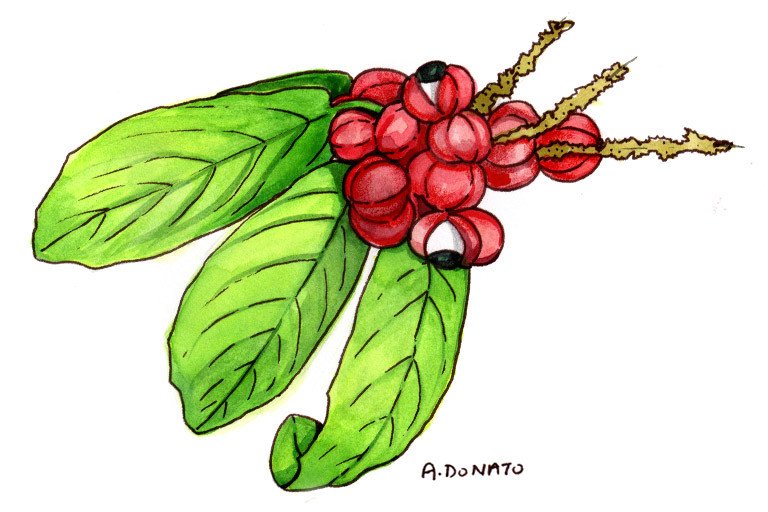
Common Names
- Guarana gum
- Guarana seed
- Zoom cocoa
- Brazilian cocoa
For Patients & Caregivers
Tell your healthcare providers about any dietary supplements you’re taking, such as herbs, vitamins, minerals, and natural or home remedies. This will help them manage your care and keep you safe.
Guarana comes from the seeds of the guarana plant. It is used in traditional medicine for many issues. The seeds have caffeine and other chemicals that are like caffeine in them.
Guarana supplements come as tablets, capsules, and powders.
Guarana is used to:
- Make you less hungry
- Manage fatigue (feeling very tired or having less energy than usual)
- Increase sexual performance
- Increase your energy
Guarana also has other uses, but doctors have not studied them to see if they work.
It’s generally safe to take small amounts of guarana. Talk with your healthcare provider before taking guarana supplements. Herbal supplements are stronger than the herbs you would use in cooking.
Supplements can also interact with some medications and affect how they work. For more information, read the “What else do I need to know?” section below.
Side effects of guarana may include:
- Nausea (feeling like you’re going to throw up)
- Insomnia (trouble falling asleep, staying asleep, or waking up too early)
Side effects of taking high amounts of guarana supplements may include:
- Vomiting (throwing up)
- Changes to your heartbeat
- High blood pressure
- Seizures (uncontrollable shaking)
- Talk with your healthcare provider if you’re taking stimulants. Guarana is also a stimulant so taking both at the same time may not be safe.
- Talk with your healthcare provider if you’re taking blood thinners such as warfarin (Coumadin®, Jantoven®). Guarana may increase your risk of bleeding.
For Healthcare Professionals
A bushy plant prevalent in the Amazon Basin, guarana is used in traditional medicine to treat fevers, headaches, and dysentery. The plant’s physiological actions are attributed to the caffeine found in its seeds (2) (3). Guarana is promoted as an appetite suppressant, stimulant, as an aphrodisiac, and to alleviate fatigue.
In vitro studies indicate that guarana has chemopreventive (11) (12), neuroprotective, (13) and anxiolytic (14) properties. Epidemiologic data suggest protective effects against metabolic disorders in elderly populations (15), and guarana supplementation led to improvements in cognitive performance and mental fatigue in healthy adults (16).
Small studies in cancer patients suggest guarana may help reduce chemotherapy-related fatigue, stabilize weight, and increase appetite (22) (25) (26). However, it did not reduce fatigue post-radiation or in patients with head and neck cancers, and some symptoms worsened compared with a placebo (17) (27). A meta-analysis also concluded that guarana was not superior to placebo for cancer-related fatigue and that evidence was of low quality (30). Further research is needed.
- Appetite suppression
- Fatigue
- Sexual performance
- CNS Stimulant
Many of guarana’s effects are thought to be due to its high caffeine content. Caffeine’s effects include skeletal muscle, CNS, and cardiac stimulation, diuresis, increased blood pressure, inhibition of platelet aggregation, and hyperglycemia (2) (3). Guarana demonstrated antioxidant effects by inhibiting lipid peroxidation (19). Chronic exposure to guarana seed extract produced an anxiolytic effect involving dopaminergic and serotonergic neurotransmission systems (14).
Case reports
- Vomiting, agitation, tachycardia, hypertension, or nausea: Pediatric cases with abuse or misuse of guarana-containing supplements (28).
- Tachycardia: In 2 women consuming guarana-containing supplement/energy drinks (29).
- Premature ventricular contractions: In a 25-year-old woman with pre-existing mitral valve prolapse following consumption of guarana (7).
- Seizures: In 4 healthy young adults following consumption of an energy drink that contained guarana along with other ingredients (18).
Anticoagulant or antiplatelet drugs: Lab studies indicate guarana has antiplatelet activity and may therefore have additive effects (20) (21). Clinical relevance has yet to be determined.
Amiodarone: A study in rats showed that guarana extract decreases bioavailability of amiodarone (24). Clinical relevance has yet to be determined.
May cause arrhythmia and elevate blood pressure (7).